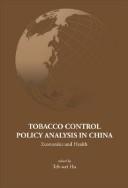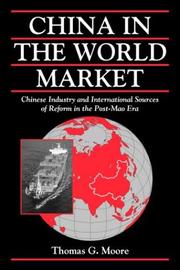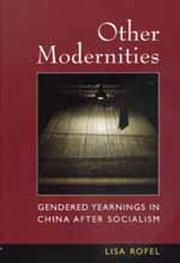| Listing 1 - 4 of 4 |
Sort by
|

ISSN: 17930847 ISBN: 1281934070 9786611934071 9812792368 9789812792365 9789812706072 9812706070 Year: 2008 Volume: v. 12 Publisher: Hackensack, N.J. World Scientific
Abstract | Keywords | Export | Availability | Bookmark
 Loading...
Loading...Choose an application
- Reference Manager
- EndNote
- RefWorks (Direct export to RefWorks)
This is the first book that analyzes tobacco control policies in China from the perspectives of economics and health. For readers interested in the economic aspects of tobacco control policy issues not only in China but also in other developing countries, this book provides a comprehensive analytical and empirical framework addressing key debated issues. This book covers a range of interesting topics from the prevalence of smoking in China, health and economic burden of smoking in China, demand for cigarettes and taxation in China, the role of tobacco on farming, the tobacco industry and the
Tobacco use --- Tobacco habit --- Habit --- Substance abuse --- Nicotine addiction --- Government policy --- S10/0522 --- S20/0450 --- S21/0500 --- China: Economics, industry and commerce--Light industry --- China: Agriculture forestry, fishery, natural disasters--Land tenure and utilization: after 1949 --- China: Medicine, public health and food--Public health, hospitals, medical schools, etc

ISBN: 052166442X 0521662834 0511040660 0511175981 0511156685 0511304188 0511510314 1280420995 0511049072 1107118646 9780511040665 9780521662833 9780521664424 9780511049071 9780511156687 9780511510311 9786610420995 6610420998 9781107118645 9781280420993 9780511175985 9780511304187 Year: 2002 Publisher: Cambridge, UK ; New York : Cambridge University Press,
Abstract | Keywords | Export | Availability | Bookmark
 Loading...
Loading...Choose an application
- Reference Manager
- EndNote
- RefWorks (Direct export to RefWorks)
This book reframes our thinking about the nature of China's reform and opening. Thomas Moore argues that the structuring impact of the international political economy represents one of the most theoretically important yet inadequately studied issues concerning change in post-Mao China. After carefully defining his conceptual framework, Moore presents detailed case studies of textiles and shipbuilding to examine the impact of varying degrees of economic openness in the world trading system on the reform, restructuring, and rationalization of Chinese industries. As the book amply demonstrates, the international environment most propitious for change in China's textile and shipbuilding industries during the 1980s and 1990s was one marked by moderate economic closure rather then the ideal-typic economic openness assumed by most observers. Moore also challenges popular notions of China's recent economic success by arguing that Beijing's ability to pursue strategic industrial policy is actually quite limited.
S10/0520 --- S10/0821 --- S10/0522 --- S10/0521 --- S10/0641 --- China: Economics, industry and commerce--Industry: since 1949 --- China: Economics, industry and commerce--Ships and shipbuilding --- China: Economics, industry and commerce--Light industry --- China: Economics, industry and commerce--Heavy industry --- China: Economics, industry and commerce--Foreign trade and economic relations: since 1989 --- China - Economic conditions - 1976-2000. --- Economic history. --- Industries. --- Business & Economics --- Economic History --- China --- Foreign economic relations. --- Economic conditions --- Social Sciences --- Political Science --- Industries --- Economic history
Book
ISBN: 9780470405581 Year: 2009 Publisher: Hoboken, N.J. Wiley
Abstract | Keywords | Export | Availability | Bookmark
 Loading...
Loading...Choose an application
- Reference Manager
- EndNote
- RefWorks (Direct export to RefWorks)
Economic policy and planning (general) --- China --- Manufactures --- Work environment --- S10/0251 --- S10/0330 --- S10/0522 --- Climate, Workplace --- Environment, Work --- Places of work --- Work places --- Working conditions, Physical --- Working environment --- Workplace --- Workplace climate --- Workplace environment --- Worksite environment --- Environmental engineering --- Industrial engineering --- Manufactured goods --- Manufactured products --- Products --- Products, Manufactured --- Commercial products --- Manufacturing industries --- China: Economics, industry and commerce--General works and economic history: since 1989 --- China: Economics, industry and commerce--Employment --- China: Economics, industry and commerce--Light industry --- Economic conditions

ISBN: 0520919866 0585273367 9780520919860 9780585273365 9780520210783 0520210786 9780520210790 0520210794 0520210786 0520210794 Year: 1999 Publisher: Berkeley, Calif. ; London : University of California Press,
Abstract | Keywords | Export | Availability | Bookmark
 Loading...
Loading...Choose an application
- Reference Manager
- EndNote
- RefWorks (Direct export to RefWorks)
"In this analysis of three generations of women in a Chinese silk factory, Lisa Rofel brilliantly interweaves the intimate details of her observations with a broad-ranging critique of the meaning of modernity in a postmodern age. The author based her study at a silk factory in the city of Hangzhou in eastern China. She compares the lives of three generations of women workers: those who entered the factory right around the Communist revolution in 1949, those who were youths during the Cultural Revolution of the 1970's, and those who have come of age in the Deng era. Exploring attitudes toward work, marriage, society, and culture, she convincingly connects the changing meanings of the modern in official discourse to the stories women tell about themselves and what they make of their lives."--Book cover.
Women --- Women silk industry workers --- Women and socialism --- Socialism --- Gender & Ethnic Studies --- Social Sciences --- Gender Studies & Sexuality --- Socialism and women --- Silk industry --- Women textile workers --- Human females --- Wimmin --- Woman --- Womon --- Womyn --- Females --- Human beings --- Femininity --- Marxism --- Social democracy --- Socialist movements --- Collectivism --- Anarchism --- Communism --- Critical theory --- Case studies. --- History --- Case studies --- Employees --- China --- S10/0522 --- S11/0710 --- S11/0720 --- S11/0730 --- China: Economics, industry and commerce--Light industry --- China: Social sciences--Women: general and before 1949 --- China: Social sciences--Women's emancipation movement: general and before 1949 --- China: Social sciences--Women: since 1949 --- Femmes --- Soie --- Femmes et socialisme --- Socialisme --- Cas, Etudes de --- Industrie --- Personnel féminin --- Histoire --- Chine --- History.
| Listing 1 - 4 of 4 |
Sort by
|

 Search
Search Feedback
Feedback About UniCat
About UniCat  Help
Help News
News